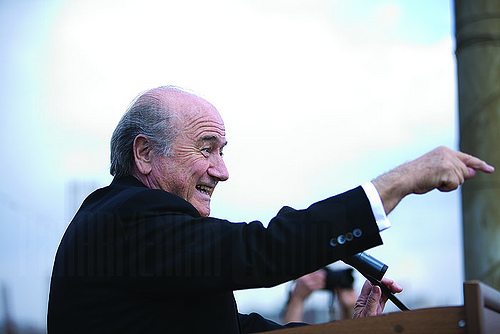Qatar fiasco is an embarrassment to FIFA
FIFA must be glad for the existence of the acclaimed video game of the same name, or else the label would only be synonymous with controversy.
From allegations of corruption and bribery, to farcical decision making and handling of major issues, to ludicrous statements in the press, Blatter and company have managed to convert football’s governance into an untrustworthy, embarrassing mess.
No event has been more damaging, though, than their awarding of the 2022 World Cup.
The shambles began almost three years ago. Whilst most British fans were still wallowing in the disappointment of losing the 2018 World Cup to Russia, FIFA announced that the 2022 competition would be held in Qatar.
Yes, Qatar. The same Qatar that has average summer temperatures in excess of 40 degrees Celsius. The same Qatar that contains exactly zero stadiums fit for purpose of the required twelve. The same Qatar that prohibits alcohol from being consumed in public.
The infrastructure issues were easily fixed, mainly due the ridiculous sums of money Qatar were willing to throw at their problems. Plans were laid out to build nine new stadiums and adapt the existing three to accommodate a larger capacity crowd.
Some of these would then be ‘flat-packed’ and sent to poorer nations, as Qatar does not possess the population or footballing background to take advantage of the subsequent empty stadiums. Not ideal, but at least the legacy of the World Cup would benefit someone.
The most notable and probably most serious predicament was the heat. Even the FIFA medical committee advised against holding the World Cup in such temperatures, citing the danger to both fans and players. And not even Qatar could buy a change in the climate, right?
Well, no, but they gave it a respectable attempt, planning to air condition every stadium to manageable levels. This was until the company designing the stadiums labelled these proposals as “notoriously unsustainable” and that the agreed 26 degree temperature was “excessively low”. Oh dear.
Since then, the media has been brewing up a storm with speculation that the World Cup could be rescheduled for a winter date, which was met with a virtually unanimous negative response. It seemed very unlikely, as it would face opposition from leagues, broadcasters and fans alike.
FIFA must be glad for the existence of the acclaimed video game of the same name, or else the label would only be synonymous with controversy
Nevertheless, the European Club Association and UEFA have now both given public backing to the rearrangement of the tournament to winter.
There are so many problems here that I barely know where to begin. Firstly, these plans would break a tradition dating back to the first tournament in 1930, as it, and every World Cup since, has taken place in summer. Not everyone cares about heritage, I grant, but it is laughable how quick this regime is to turn its back on customs.
Then there is the issue of the effect on domestic football. A winter World Cup falls right in the middle of the domestic seasons of the main leagues in Europe, and would almost certainly cause major disruption to their calendars for the season containing the tournament and the campaigns either side of it.
This effect would be especially prominent in leagues without an existing winter break, such as the English Premier League. Ironically, UEFA, who have supported the change, stand to lose the most from the move due to the interference caused to the Champions League and Europa League schedules, two of their most profitable competitions.
FIFA have also managed to infuriate key organisation with their plans. FOX Sports, who have already bought the rights to the American coverage of the cup for a tidy sum of $630 million, have already discussed potential legal action against FIFA.
You can understand their frustration – their multimillion dollar investment will be rescheduled so it clashes with their coverage of the NFL playoffs and college football, a sizeable blow to their profitability. The International Olympic Committee, similarly, has warned FIFA not to allow the World Cup to conflict with the Winter Olympics of the same year so as not to affect its returns.
Despite its numerous disadvantages, moving the World Cup to winter is the only logical course of action if the contest is to remain in the Middle East. Then again, all of these difficulties could have been avoided if the competition were simply to have been awarded to one of the other, more suitable nations in the first place, thus circumventing the need for the countless months of speculation, delegation and frustration that are sure to follow.

Comments